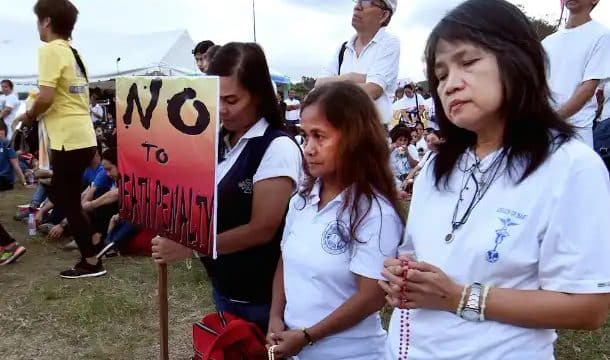
MANILA (UCAN): On October 5, Philippine lawmakers began tackling a top priority bill presented to the Senate in a bid to revive the death penalty. The bill is included in a list of 20 priority pieces of legislation to go before lawmakers.
“We will once again argue whether the state has the right to take the life of erring individuals. Our nation’s view of morality and how far we’re willing to be affected by it will once again be tested,” a senator, Win Gatchalian, told reporters.
Gatchalian admitted that debating the issue would have an effect on how the Church would react and treat lawmakers who support the death penalty.
“Of course, lawmakers will always have critics, especially those who will vote in favour. Church opposition is always there. But I think members of the Philippine Senate are mature enough to admit that what is legal is not necessarily moral, and vice versa,” he added.
“Regardless of political affiliation, we as Filipinos, as one nation, would still agree on the sanctity of life and oppose any form of legislation that threatens it like abortion and the death penalty,” Father Rodil Manto from the Bishops’ Commission on Prison Pastoral Care, said.
We will once again argue whether the state has the right to take the life of erring individuals. Our nation’s view of morality and how far we’re willing to be affected by it will once again be tested
Win Gatchalian
Bishop Joel Baylon, chairperson of the commission, said they were ready “any time” to oppose the revival of the death penalty.
He called on lawmakers to dump the bill for being anti-poor, contrary to the values of Christianity to preserve and respect life.
“Besides being a threat to the sanctity of life given by God, the death penalty will only victimide the poor that have no access to competent legal representation. The death penalty will not work in an imperfect judicial system like ours,” he wrote in a Facebook post.
“We strongly and unequivocally oppose moves in the present Congress to restore the death penalty… Instead, we call on legislators to pass laws that are more inclusive thereby making our criminal justice system more pro-life and pro-poor,” the bishop wrote.
As we celebrate the 500 years of Christianity in the Philippines. The Chaplaincy to Filipino Migrants organises an on-line talk every Tuesday at 9.00pm. You can join us at:
https://www.Facebook.com/CFM-Gifted-to-give-101039001847033
Supporters of the bill, however, told Catholic clergy to “stay out” of the debate and let lawmakers decide on the bill’s merits.
Regardless of political affiliation, we as Filipinos, as one nation, would still agree on the sanctity of life and oppose any form of legislation that threatens it like abortion and the death penalty,
Father Rodil Manto
“They should stay away from this and let the legal process take its course. Sovereign states like ours have the right to implement the death penalty. Even our own constitution does not prohibit it,” a Manila parishioner and death penalty advocate, Tristan Alejandro, said.
The Philippines was the first Asian country to abolish the death penalty under the 1987 constitution. However, it was re-imposed during the administration of the late president, Fidel Ramos, to address a rising crime rate in 1993.
However in 2006, with almost 1,200 inmates on death row, former president, Gloria Arroyo, imposed a moratorium ahead of an audience with St. Pope John Paul II at the Vatican.
The Philippines also signed and ratified the Second Optional Protocol to the International Covenant on Civil and Political Rights, aimed at the abolition of the death penalty [ICCPR-OP2] on 20 November 2007.
The issue returned to the fore before the May 2016 national election, when former president, Rodrigo Duterte, vowed to reintroduce the death penalty to combat drug trafficking in the Philippines.
A bill to revive it was passed on 2 March 2021, to implement “tougher” punishments for violators of drug laws.
Should the bill pass Senate scrutiny, it will be forwarded to Ferdinand Marcos, Jr., the current president, for approval.



